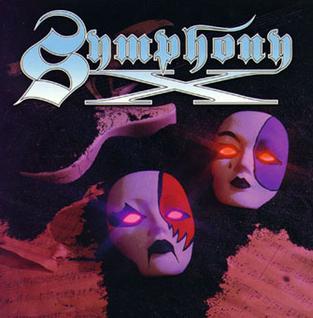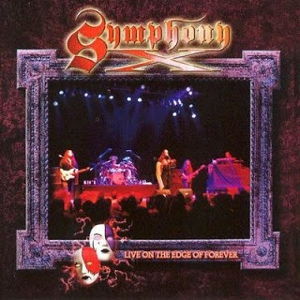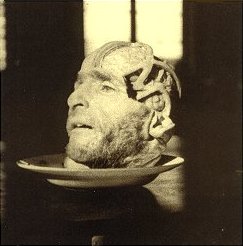The Piano Sonata No. 8, Op. 66, by Alexander Scriabin, was composed between 1912 and 1913. As one of Scriabin's late piano sonatas, the eighth sonata is highly atonal, though arguably less dissonant than some of his other late works. Like Scriabin's other late piano sonatas, the eighth sonata reflects the composer's mystical interests. Scriabin saw some parts of this sonata, which, like the sixth sonata, he never performed in public, as "the most tragic episode of my creative work".

The Piano Sonata No. 5, Op. 53, is a work written by Alexander Scriabin in 1907. This was his first sonata to be written in one movement, a format he retained from then on. A typical performance lasts from 11 to 12 minutes.

Symphony X is the first studio album by progressive metal band Symphony X, originally released in 1994 through Zero Corporation in Japan, and reissued in 1996 through Inside Out Music in Europe; a remastered edition was reissued on January 13, 2004 through Inside Out Music. The album's release came about as a result of band guitarist Michael Romeo's 1994 solo album, The Dark Chapter, achieving success in Japan. It is the only Symphony X album to feature singer Rod Tyler, who would be replaced by Russell Allen on all subsequent works.

The Damnation Game is the second studio album by progressive metal band Symphony X, released in 1995 through Zero Corporation (Japan) and Inside Out Music (Europe); a remastered edition was reissued on September 13, 2004 through Inside Out. The album is the band's first to feature current singer Russell Allen, who replaced Rod Tyler after the release of their 1994 self-titled debut album.

Twilight in Olympus is the fourth studio album by progressive metal band Symphony X, released in 1998 through Zero Corporation (Japan) and Inside Out Music (Europe); a remastered special edition was reissued on January 13, 2004 through Inside Out. The album features drums played by Thomas Walling, who filled in for regular drummer Jason Rullo after he temporarily left the band for personal reasons. It is also the last Symphony X album with longtime bassist Thomas Miller, who left the band during the album's tour.

Live on the Edge of Forever is the first live album by progressive metal band Symphony X, which was recorded on their European tour in 2000 and 2001. The album starts like their previous studio effort V – The New Mythology Suite, but whereas "The Death of Balance" normally segues into "Lacrymosa," it now segues into "Candlelight Fantasia" from The Divine Wings of Tragedy album. Many classics are eventually played, including the neoclassical "Smoke and Mirrors" and the epic "The Divine Wings of Tragedy." No tracks from the first two albums are performed, even though the album's title references a track from The Damnation Game.

The Odyssey is the sixth studio album by progressive metal band Symphony X, released on November 5, 2002 through Inside Out Music. The album is the band's first to be recorded entirely at guitarist Michael Romeo's home studio, The Dungeon. "Accolade II" is a sequel to "The Accolade" from The Divine Wings of Tragedy (1997). The title track is the album's grand finale: a 24-minute musical interpretation of Homer's Odyssey, an epic poem about the journey of ancient Greek hero Odysseus.

Prelude to the Millennium: Essentials of Symphony is a compilation album by progressive metal band Symphony X, released in 1999. It features selections from their first four studio albums, although no original versions from their debut album Symphony X are included. Instead, the album starts with a fully re-recorded version of "Masquerade" that features Russell Allen on vocals.

Atomic Soul is Symphony X's lead singer Russell Allen's debut solo album. It was released on April 26, 2005. The album is different from Symphony X's harder, more progressive sound, and has been dubbed by many, including Allen himself, as "Hard Rock". The album was released in 2005 on the InsideOut Music label. Allen played bass and keyboards on most tracks, along with vocals, but some of the tracks feature guests Robert Nelson on drums, Brendan Anthony and Jason Freudberg on guitars, Larry Salvatore on bass and Jens Johansson on keyboards. Also Allen's bandmates Michael Romeo and Michael Pinnella, from Symphony X, are featured on the album.

Paradise Lost is the seventh studio album by progressive metal band Symphony X, released on June 26, 2007 through Inside Out Music. It is a concept album loosely inspired by John Milton's 1667 epic poem Paradise Lost. The album was the band's first to chart on the U.S. Billboard 200, reaching No. 123 and remaining on that chart for a week, as well as reaching No. 1 on Billboard's Heatseekers and the top 100 in five other countries.

Thrashback is the sixth full-length studio album from New Jersey thrash metal band, Whiplash. It was released on Massacre Records and follows the previous year's offering Sit Stand Kneel Prey.
Thomas Miller was the bassist of Symphony X prior to the entrance of Andy DeLuca, and soon after, Michael Lepond. Miller left the band along with drummer Thomas Walling for their unwillingness to tour for the support of Symphony X's fourth studio album, Twilight in Olympus.

Grand Guignol is the second full-length studio album released by John Zorn's band Naked City in 1992 on the Japanese Avant label. The album followed Torture Garden, which was a compilation of "hardcore miniatures" from Naked City and Grand Guignol. The album is notable for the inclusion of cover versions of pieces written by classical composers, the guest vocal of Bob Dorough, and also, like Torture Garden, a selection of "hardcore miniatures" which are intense, fast-tempo, brief compositions, which feature the wailing of Zorn's alto sax, and the screams of Yamatsuka Eye.

The Dark Chapter is the first studio album by Symphony X guitarist Michael Romeo, released in April 1994 through Zero Corporation (Japan) and reissued in 2000 through InsideOut Music (Europe).

Working Man: A Tribute to Rush is a tribute album to progressive rock band Rush recorded by various artists and released on Magna Carta Records in 1996. The album was mixed by original Rush producer Terry Brown at Town Music Studios in Toronto, Canada. Mike Portnoy was the main creative consultant.

Iconoclast is the eighth album by American progressive metal band Symphony X. It was released on June 17, 2011, in Europe, June 21, 2011, in the United States and on June 28, 2011, in Canada.

Underworld is the ninth studio album by American progressive metal band Symphony X. It was released on July 24, 2015 through Nuclear Blast. The album's first single, "Nevermore", premiered on May 22, 2015, followed by "Without You" on June 19. They were both officially released on July 22, 2015. The band's guitarist, founder and main songwriter, Michael Romeo, said he was against releasing separated tracks of the album, since it was written to be "a whole".
















